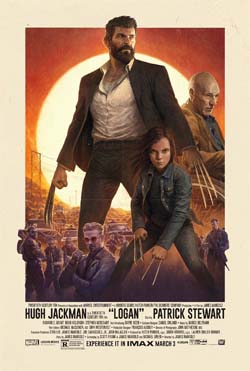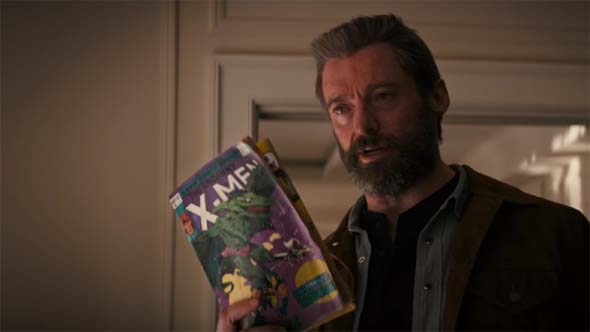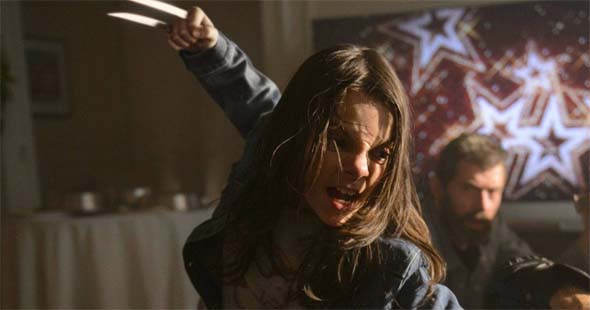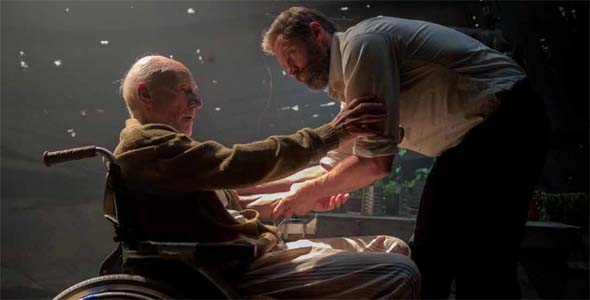
You've probably already heard this, but Logan is not a typical comic book movie. In fact, this movie feels less like a comic book movie, and more like a western combined with Terminator 2: Judgement Day and The Last of Us. This last analogy is particularly apt, considering that Logan deals with the extinction of mutants from the X-Men film universe.
The X-Men comics and movies have always been known for being topical, with their themes of racism, bigotry, and so forth, and Logan manages to to also be surprisingly topical regarding its storyline of a child fleeing [what amounts to] a violent drug cartel in Mexico, being unwelcome in the United States, and having to flee even further to Canada.
This movie even features X-Men comic books, and establishes the real-life story of the X-Men as a modern myth within the film's universe. These characters are real-life heroes and inspirations to the children who grew up in this universe. They're also maybe an inconvenient memory for many of the adults who may have grown up supporting the Mutant Registration Act or who bullied young mutants in school.
And this movie is laden with so much more possible metaphor. Logan's rejection of the comics' fallacious telling of events may symbolize our own need to let go of our childhood nostalgia regarding these fictional universes and characters and accept new and different interpretations. The final scene, with the child clutching the action figure, just so perfectly captures this bittersweet sentiment. And thank goodness that there isn't an end-credits scene, because I would have been pissed if anything had come up to ruin that perfect final shot. Or maybe it symbolizes the gradual and steady loss of our own real-world heroes. The last astronaut to walk on the moon died this year. We've lost civil rights leaders, WWII veterans are becoming increasingly rare, our 20th century pop culture icons are slowly kicking the bucket. What kinds of heroes will replace them? There's a lot to unpack here.

The X-Men are revered, mythical figures within the film's universe.
And by avoiding any strong, direct connections to other X-Men movies, Logan not only allows non X-Men fans to get into the movie without all the extra baggage, but it also kind of implies that maybe the previous movies aren't to be taken seriously either. Perhaps they, too, are part of the in-universe mythology, and we, as an audience, should not take them seriously either. Yet another way to de-canonize The Last Stand and Apocalypse, perhaps? It continues on by subverting the larger comic book and action genres. A great example of this is a fairly early scene in which Logan attempts to drive his limousine through a barbed wire fence, only to get the car stuck in the fence.
And that's what really sets Logan apart: its maturity. I'm not talking about the fact that Jackman and Stewart drop F-bombs left and right, or that people get cut to pieces in action scenes that are finally as visceral and difficult to watch as you'd expect a real-life claw fight to be. I'm talking about the surprisingly subtle, nuanced storytelling that leaves much to the imagination, and how it tells its story through visuals and silence and the framing of a shot, rather than through exposition. What is all this rambling about a "Westchester incident"? What happened to all of the mutants? Where did all the other X-Men go? The movie has answers to these questions - sad, depressing, inglorious answers. But it doesn't spill the beans with cheesy flashback scenes or blatant references to past movies or esoteric comic book issues. The bad guy does give Logan a bit of a Bond-villain wrap-up at the end, but it's very subdued and actually happens in the background of the scene while Laura skulks around.

Logan is more than a simply passing of the torch.
If there's any fault in the movie, it's that I really couldn't tell why Zander Rice was so adamant about capturing X-23. He didn't seem to be putting much effort into locating the other kids, and his research has supposedly moved on to bigger, better projects. Was he worried that X-23 and Logan might expose his project? Did he just want revenge against Logan for possibly killing his father? Maybe there was clearer motivation established in the movie, and I just missed it...
Logan is something that could easily have turned into (and which I was expecting to turn into) yet another in the increasingly-frustrating line of soft reboots, with the old actors and characters passing the torch to a new generation. Some of those have worked moderately well (Star Wars: the Force Awakens), and others have failed miserably (Indiana Jones and the Kingdom of the Crystal Skull). Yes, it's likely that X-23 and her group of new-gen mutants might turn their reverence for the in-universe X-Men comics into inspiration for founding their own team, but that's not really what this is about. This is a "good bye" to the X-Men film franchise as we know it (and to Hugh Jackman and Patrick Stewart in these roles) and a deconstruction in much the same way that the graphic novel The Dark Knight Returns was to Batman. It examines elements and assumptions about the superhero genre and about the mutant-populated world of X-Men and forces the audience to come to grips with some of the scarier, real-world consequences of these characters' powers - like what happens when Alzheimer's manifests in a telepath.

A telepath with cognitive degeneration is a scary concept...
Logan does almost everything right. It's thoughtful, heartfelt, and poignant. It is likely the best X-Men movie that's come out, and might even deserve to be in the conversation for "best comic book movie ever". And comic book-inspired or not, it's a damn good movie.